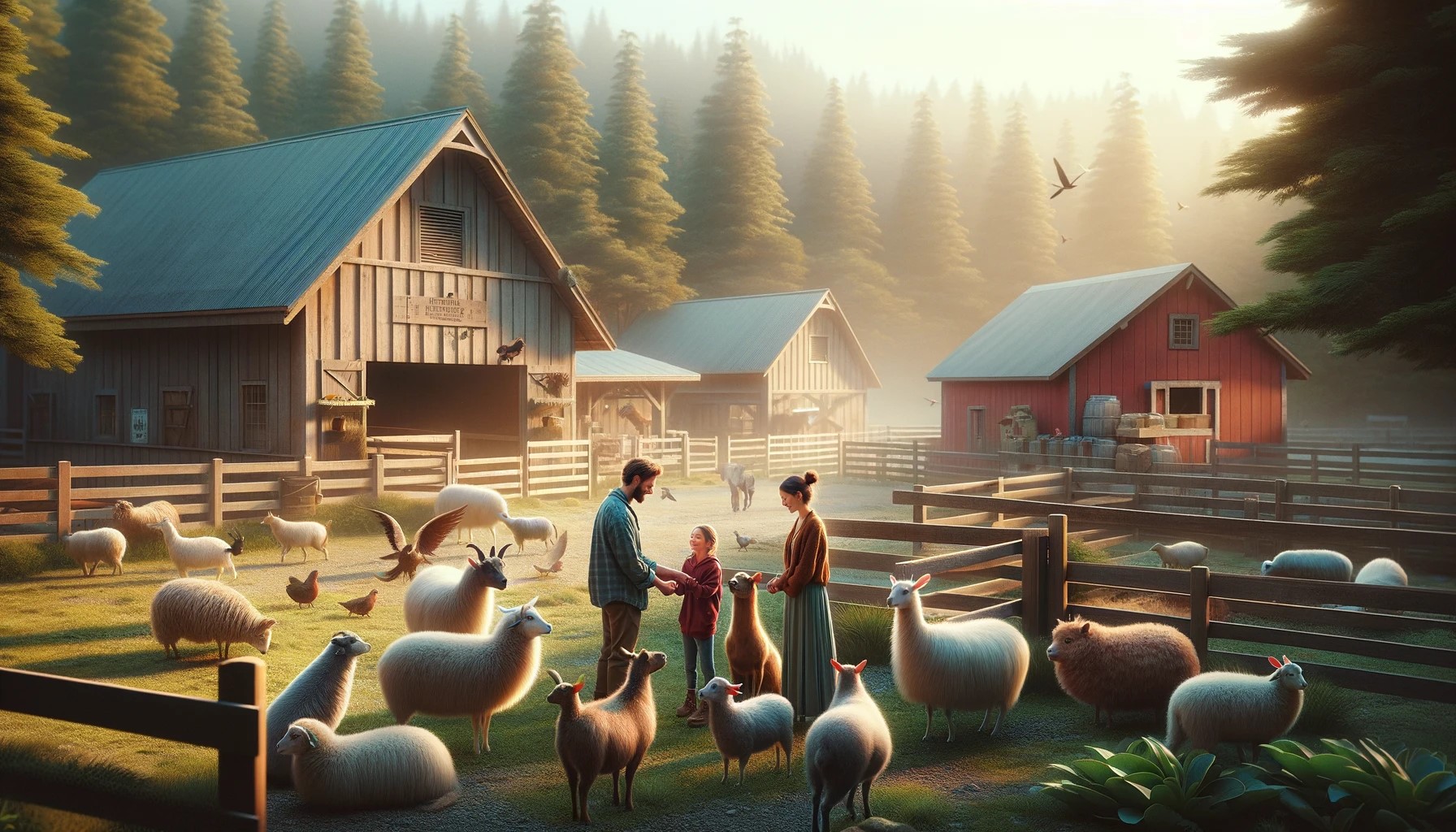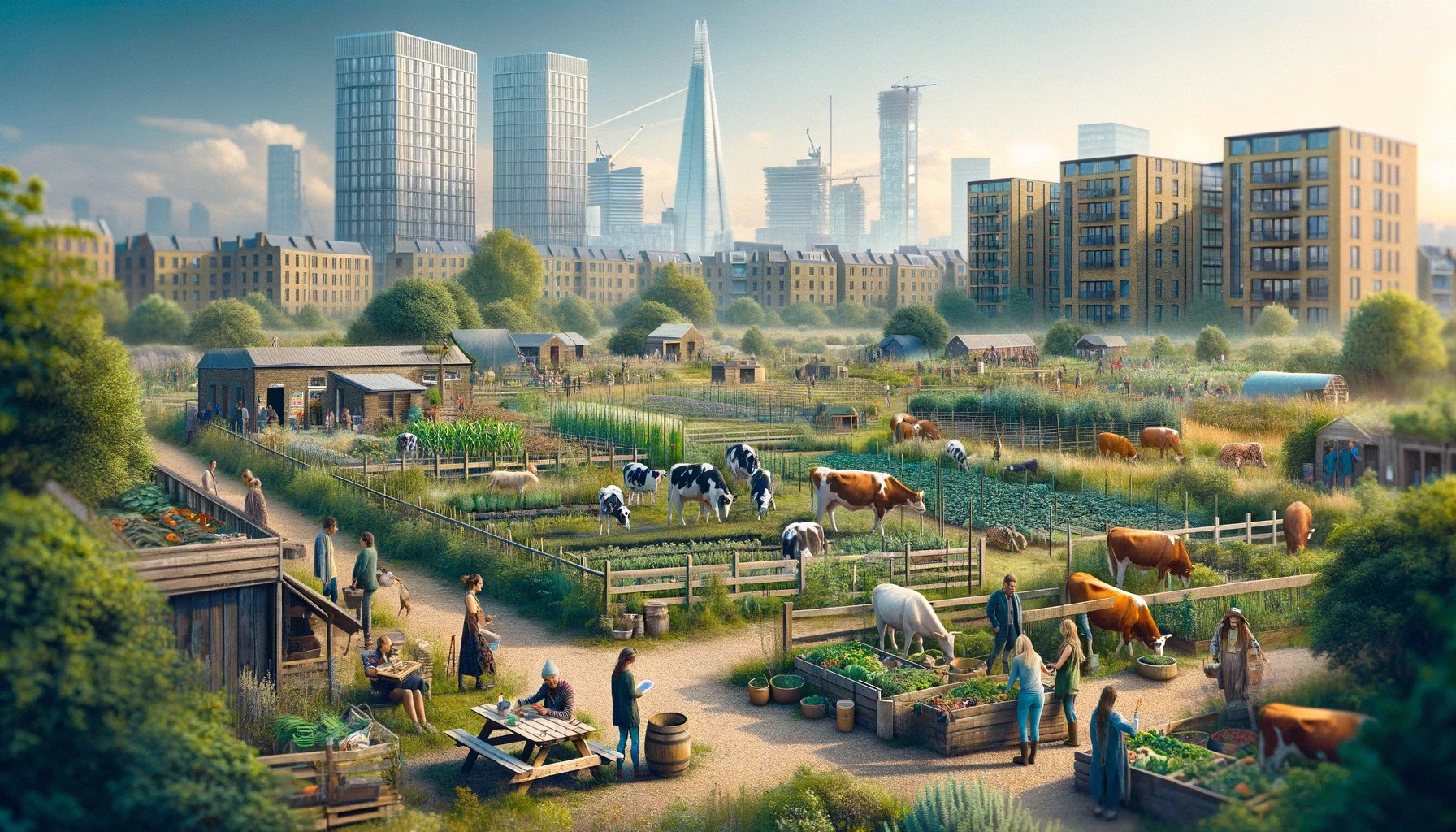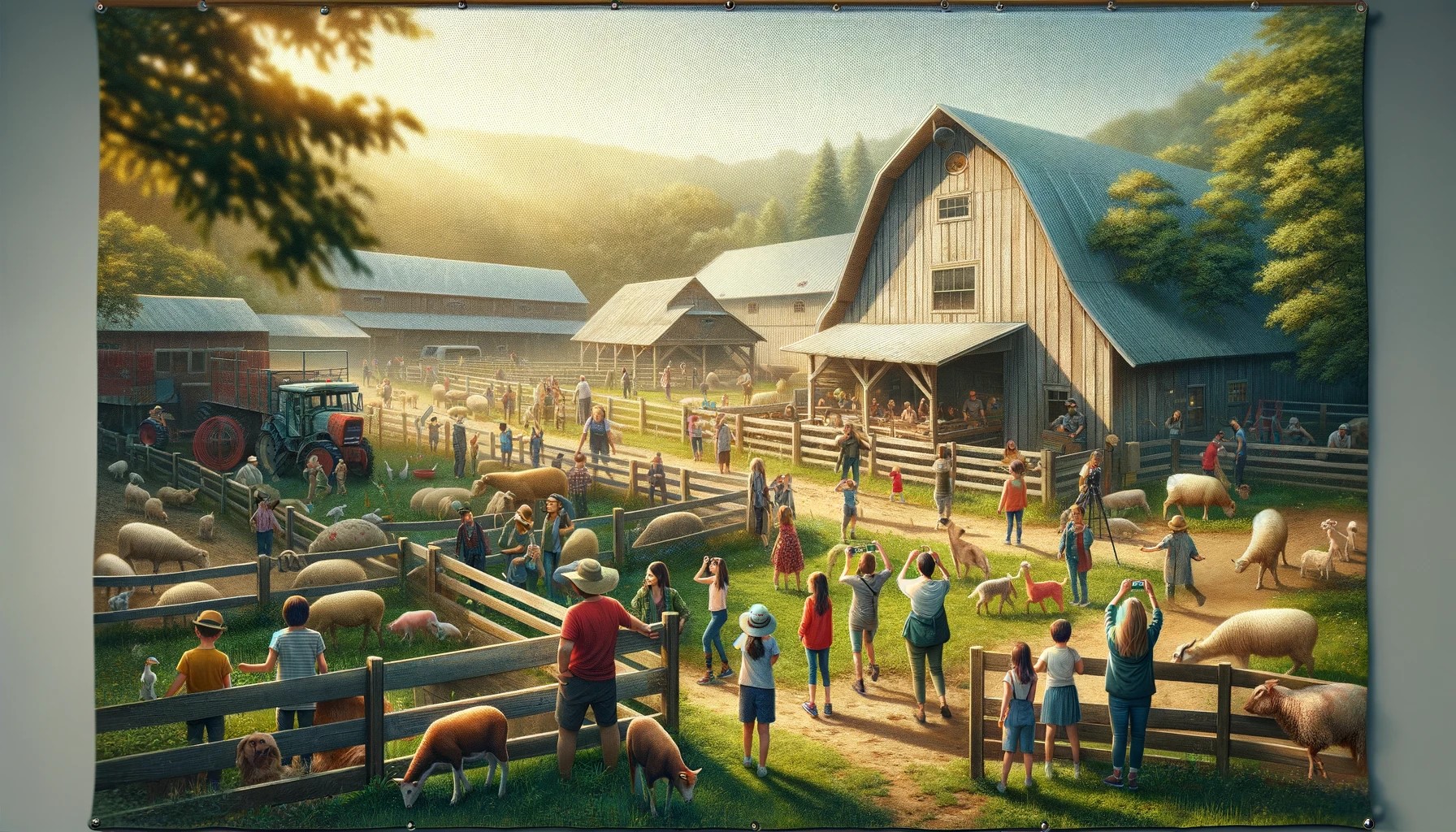Exploring Agritourism: Why Are London’s Farms Worth Visiting?
In the midst of London’s bustling cityscape, the serene farms offer a refreshing escape for both locals and tourists. These agritourism spots present a unique blend of rural charm and educational experiences, distinct from the usual urban attractions.
At these farms, you can immerse yourself in activities like fruit picking or interacting with farm animals. It’s a chance to step away from the city’s pace and connect with nature, offering a peaceful and authentic countryside experience.
Sustainable Travel Contributions
Visiting London’s farms is not just a leisure activity but a step towards sustainable travel. These tours support local agriculture and highlight the importance of organic and eco-friendly farming practices. Each visit becomes a learning experience about sustainable living.
A Different Kind of Attraction
Unlike typical London tourist spots, farm visits provide an immersive and interactive experience. They offer a unique insight into the journey from farm to table, deepening your appreciation for agriculture.
Exploring these farms enriches your knowledge of London’s agricultural past. It’s an opportunity to understand the city’s farming history and how it has shaped the current landscape, adding depth to your London experience.
Choosing the Right Farm: A Guide for First-Time Visitors
Deciding on the perfect farm to visit near London involves considering a few key factors to ensure your experience aligns with your interests and expectations.
When you’re selecting a farm, think about what type of experience you’re seeking. Are you looking for a family-friendly environment, or are you more interested in organic farming practices? Each farm has its unique offerings, from educational tours to hands-on activities, so identifying your primary interest is crucial.
Catering to Varied Interests
London’s surrounding farms vary greatly in their focus. Some may specialise in organic produce, offering tours of their sustainable practices, while others might be more suited for families, with activities like petting zoos and fruit picking. Researching beforehand ensures you find a farm that matches your interests.
Accessibility Considerations
Accessibility is a key factor. Check if the farm is easily reachable by public transport or if it requires a car. Also, consider the farm’s terrain and facilities, especially if you have specific mobility needs.
Aligning with Your Itinerary
Lastly, consider how a farm visit fits into your overall travel plan. Some farms might be ideal for a half-day visit, while others offer enough activities to fill an entire day. Aligning your farm visit with your travel itinerary ensures a seamless and enjoyable experience.
The Seasonal Guide to London Farm Tours
Each season in London brings a distinct charm to its farm tours, offering a variety of experiences throughout the year.
Optimal Times for Visits
Spring and Summer: Ideal for seeing blossoming flora and engaging in outdoor activities like fruit picking.
Autumn: Celebrate harvest festivals and enjoy the picturesque golden landscapes.
Winter: A quieter time, perfect for serene tours amidst frosty scenes.
Varying Activities with Seasons
Spring ushers in planting, while summer is bustling with crop tending and vibrant farmers’ markets. Autumn is the season of harvest, offering a chance to participate in picking and processing activities. Winter, though calmer, can offer unique indoor workshops or peaceful walks.
Each season showcases different produce and events. For instance, autumn’s apple picking and summer’s strawberry festivals provide hands-on ways to engage with the farms’ seasonal rhythms.
To make the most of your visit, align your activities with the season. Plan ahead during busier seasons like summer to avoid crowds. Off-peak seasons like winter offer a more tranquil experience, often with a personal touch. No matter the season, London’s farm tours promise a unique and enriching experience.
A Day at the Farm: What to Expect and How to Prepare
Embarking on a farm visit near London offers a delightful blend of educational and recreational activities. It’s an opportunity to immerse yourself in the rustic charm of the countryside, but being well-prepared is key to maximising your experience.
Expect a variety of activities ranging from leisurely walks through fields and orchards to more hands-on experiences like feeding animals or picking fruits. Many farms also offer guided tours that provide insights into farming practices and local agriculture.
Dressing and Packing for the Farm
Comfort is crucial for a day at the farm. Opt for casual, weather-appropriate clothing and sturdy footwear suitable for walking on uneven terrain. Don’t forget essentials like a hat, sunscreen, and a water bottle. Carrying a small backpack can be useful for storing personal items and any farm produce you might buy.
Be mindful of health and safety rules, especially around animals. Farms often have guidelines to ensure both your safety and the well-being of the animals. Wash hands after contact with animals, and always supervise children during such interactions.
Respecting Farm Animals and the Environment
Interacting with farm animals is a highlight for many. Approach them gently and follow the farm’s guidance on interaction. Respecting the farm environment is crucial; remember to leave no trace behind and be considerate of the natural surroundings. By doing so, you ensure a positive experience for yourself and future visitors.
Organic and Sustainable Farming: Learning and Participation Opportunities
Visiting farms around London provides a unique opportunity to delve into the world of organic and sustainable farming. These farms are not just places for leisure; they are educational hubs where you can learn about eco-friendly farming practices and their impact on the environment.
Learning About Organic Practices
Many farms offer guided tours and workshops focusing on organic farming methods. You can learn about crop rotation, natural pest control, and composting. These sessions provide valuable insights into how sustainable practices are implemented and maintained.
Hands-On Farming Activities
For a more immersive experience, some farms allow visitors to participate in day-to-day activities. This might include planting seedlings, harvesting crops, or even participating in farm animal care. These hands-on experiences offer a deeper understanding of the hard work and dedication behind organic farming.
Environmental and Community Impact
These farms play a crucial role in promoting environmental stewardship and community well-being. By practising sustainable farming, they help in conserving biodiversity, improving soil health, and reducing carbon footprints, contributing positively to London’s ecological balance.
Exemplifying Sustainable Living
These farm visits underscore the importance of sustainable living in an urban context like London. They demonstrate how integrating eco-friendly practices into our daily lives can contribute to a healthier, more sustainable future, inspiring visitors to adopt similar practices in their own lives.
Family-Friendly Farm Activities: Fun for All Ages
A farm visit in London offers a unique and engaging experience for families, blending education with fun in a natural setting. These visits provide an excellent opportunity for children and adults alike to learn about agriculture and nature while enjoying a variety of activities.
Ideal Family Activity
Farm visits are ideal for families because they offer a chance to bond in a relaxed, outdoor environment. Children get to explore and learn in a hands-on manner, gaining new experiences away from the usual city life.
Engaging Activities for Children
Many farms around London cater specifically to young visitors. They offer activities like petting zoos, pony rides, and interactive farm tours. These experiences are not only enjoyable but also educational, teaching kids about farm animals and where their food comes from.
Educational elements are woven into activities in an engaging way. Children can participate in fruit and vegetable picking, learn about the lifecycle of plants, or take part in nature crafts, making learning both fun and memorable.
Accommodating Facilities for Families
Farms are equipped with facilities to ensure a comfortable visit for families. This includes baby changing areas, picnic spots, and sometimes even playgrounds. These amenities make it easier for families to spend a whole day exploring and enjoying the farm environment.
Tasting the Harvest: Culinary Experiences on London Farms
London farms offer a palate-pleasing journey that combines fresh, local produce with the art of cooking. These culinary experiences are not just about tasting food; they’re about understanding the journey from farm to table.
Unique Culinary Experiences
You’ll find a variety of unique culinary experiences at these farms. From tasting freshly picked fruits and vegetables to enjoying homemade preserves and cheeses, each farm offers a different flavour of the countryside. Some even host gourmet farm-to-table dinners, where you can dine amidst the very fields where your food was grown.
Farm-to-Table Meals
Farm-to-table meals are a speciality at these farms. They provide a unique gastronomic experience, featuring menus crafted from the freshest ingredients, often picked just hours before serving. This not only ensures superior flavour but also supports sustainable agriculture.
Cooking Classes and Workshops
For those keen on culinary arts, many farms offer cooking classes or food-related workshops. These sessions often focus on using seasonal produce, teaching you to cook with what’s available locally and sustainably.
Highlighting Local and Seasonal Produce
These culinary experiences are an excellent way to connect with London’s local and seasonal produce. They emphasise the importance of eating seasonally and support the local farming community, all while providing an unforgettable gastronomic experience.
Beyond the Farm: Connecting with London’s Agricultural Community
After a delightful farm visit, your journey into the agricultural world of London doesn’t have to end. There are numerous ways to stay connected and continue supporting the local farming community.
Engaging with the Agricultural Community Post-Visit
You can deepen your engagement with the agricultural community by following farms on social media or signing up for their newsletters. This way, you stay informed about upcoming events, new products, and ways to support their endeavours.
Local Markets and Events
London’s local markets are a treasure trove of farm produce and artisanal goods. Visiting these markets not only supports local farmers but also allows you to enjoy fresh, seasonal produce. Look out for special events like harvest festivals or farm-to-table dinners, which often showcase the best of local farming.
Fostering Ongoing Relationships
Farm visits create a unique bond between urbanites and farmers. By understanding the effort behind farming, you can appreciate the value of local produce and are more likely to support these farmers in the future.
Supporting Local Agriculture
Supporting local agriculture can extend beyond farm visits. Purchasing local produce, advocating for local farming in community discussions, and participating in community-supported agriculture (CSA) programs are great ways to keep the connection alive and thriving.
Photography and Social Media: Capturing the Rustic Charm
Capturing the essence of your farm visit through photography can be a delightful way to preserve memories and share your experiences. Here are some tips to help you photograph the rustic charm of London’s farms and share your moments responsibly on social media.
Best Practices for Photographing Farm Landscapes
When photographing farm landscapes, focus on natural lighting, especially during the golden hours of sunrise and sunset. This creates a warm, inviting glow. Try to capture the farm’s unique features, like barns, animals, or rows of crops, and use different angles to add depth to your images.
Responsible Social Media Sharing
When sharing your farm experiences on social media, it’s important to be respectful and mindful. Always ask for permission before photographing people or private areas on the farm. Ensure that your posts reflect the farm’s values and contribute positively to its image.
Consider creating a photo journal or a mini-documentary of your farm visit. You can also use social media features like stories or reels to share interactive and engaging content.
Enhancing Appreciation through Photography
Photography can deepen your appreciation of London’s rural landscapes. By focusing on the details and beauty of the farm environment, you can capture the essence of the countryside and share the story of rural life with a wider audience. This not only creates lasting memories for you but also raises awareness and appreciation for London’s agricultural heritage.
Final Thoughts: Embracing Agritourism in London
As we reflect on the journey through London’s agritourism, it’s clear that farm visits offer much more than a day out in the countryside. They have profound impacts on both tourists and Londoners, fostering a deeper connection with our food sources and the natural world.
Lasting Impacts of Farm Visits
Farm visits leave a lasting impression by providing an authentic experience of rural life. They offer a break from the urban hustle, allowing you to appreciate the tranquillity and beauty of nature. These experiences often lead to a renewed respect for the environment and the hard work of farmers.
These tours enhance your understanding of how food is grown and the challenges of agriculture. This knowledge can lead to more informed food choices and a greater appreciation for seasonal and locally sourced produce.
Bridging Urban and Rural Divides
Agritourism plays a crucial role in bridging the gap between urban and rural communities. It provides a platform for understanding and collaboration, breaking down misconceptions and building mutual respect.
The lessons learned from farm visits can be integrated into everyday life in London. This might mean choosing local produce, participating in community gardens, or simply sharing your experiences and knowledge with others. By doing so, you’re not only living a more sustainable life but also supporting the local agricultural community.




